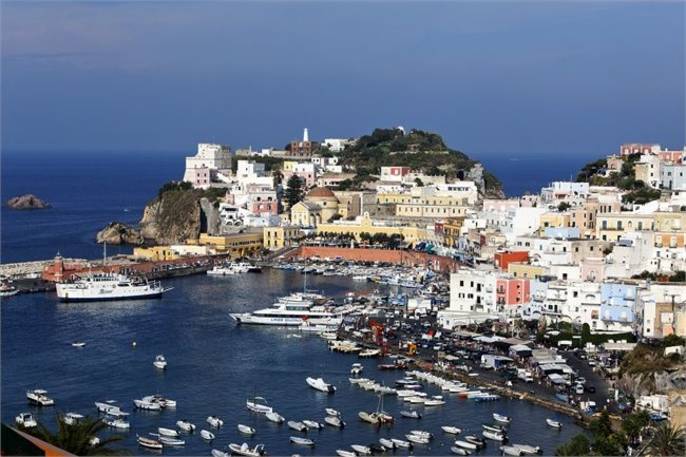


Italy has always exerted a great pull on the international community. I have had the great fortune to spend my whole life promoting my country. I have promoted it as a place to discover new experiences, but most of all as an emotionally restorative place, thanks to the fantastic diversity of our territory;
its artistic, cultural and environmental variety; its abundance of great food and wine; and above all its humanity, the chance to encounter the people of this land. After all these years working in a promotional capacity, work I have always undertaken with pride and passion, I particularly remember the deep impression my visits to the country’s small islands have made on me.
Besides visits to Sicily and Sardinia, two large and very different islands that are equally unforgettable from a cultural, environmental and human standpoint, over the years I have been lucky enough to have traveled to a few of the smaller islands, starting with Elba, the third largest island in Italy best known for being Napoleon’s place of exile. (This year marks the bicentennial of his arrival on the island.) Elba represents an important time in my life. I was very young. It was the first trip I could claim as “my own.” I went with friends of my brother and got the chance to go camping for the first time in my life. I can still call up the memory of the campground in Lacona, the immediate sensation of the sea and sky.
It was the feeling of independence, of freedom. Day after day I discovered Elba’s diverse landscapes, from the beautiful adjacent beaches at Porto Ferraio to the forgotten landscapes of Capolivero. Behind every bend in the road, I discovered new colors, new perspectives and new contrasts.
My second island, or rather group of islands, was the Aeolian archipelago. I celebrated my fortieth birthday on Lipari, Vulcano and Panarea. Then I made a memorable excursion to Stromboli. I landed in Ginostra, a small village with no port to speak of The hydrofoil stopped 100 meters from the dock, and we had to take a rowboat the rest of the way. I remember the climb up to Stromboli. The road through the village was a rich blend of aromas and salt air.
I remember the black sand of the beach, so different from the bright white sand of Lipari’s pomice. It was just as otherworldly as the boiling mud on the beach of Vulcano, where you entered the water only a few feet away from where bubbles leapt about on the surface, pushed upward by hot steam trapped in the water. I remember my wife and I taking a Vespa out to see what we could find on Vulcano, and later doing the same on Lipari.
A Vespa was the ideal means of transportation for those places. The rush of wind made you forget all about the sun beating down, and by the time you got back home you had a mean sunburn. I remember the exquisite hospitality on Panarea and the family-run hotel where we stayed, the most traditional on the island, which might still exist.
My third island experience came a few years ago, on an unforgettable day in December. I was vacationing in Sorrento with my wife and children, and we decided to take a trip to Capri. It was a beautiful day, so we rented two yellow scooters. Alex rode with me, and Grazia took Giulia. We tooled around the whole island. Thanks to the time of year we had the island to ourselves and could take in all of its enchantments. Capri’s a place with breathtaking views of seastacks in the distance. We capped off the day with an aperitif in the little piazza before hopping back on the ferry, with the sun setting behind us. It is one of the most beautiful memories I have of that short but very intense vacation which my family still talks about.
I have only mentioned a few of the many islands in the country. Mention should be made of Giglio and all it has come to represent in recent years. And of the islands made famous in literature, like the Island of Monte Cristo in the Tuscan archipelago. But that’s not all. I mentioned Capri but not Ischia. I haven’t mentioned the Pontino archipelago and the breathtaking panoramas of Ponza. I remember watching a recent documentary showing images of Ponza and its ocean floor and feeling the urge to go see it myself.
The wait was well worth it; the documentary had nothing on the real thing. As with Ponza, so with Ventotene and the Egadi Islands, places steeped in tradition and teeming with culture across the middle of the Mediterranean. Think of Pantelleria, with its historic country houses known as dammusi, its cultivation of capers and production of passito. Don’t leave Lampedusa off your list, with its famous Spiaggia dei Conigli, which TripAdvisor voted one of the most beautiful beaches in the world in 2012. The island has displayed a remarkable capacity for receiving all those who land on its shores; thousands of people dreaming of a better life arrive on Lampedusa every day, and the people of the island have proved very hospitable given the difficult circumstances. The island is a model of human solidarity for the whole world.
Finally, I’d like to mention CNN’s recent look at the islands of Italy that once functioned as prisons and places of exile for political undesirables. Remote, difficult to reach, little visited by tourists, these islands have remained unspoiled, their natural landscapes and wildernesses preserved. According to CNN, Monte Cristo, Pantelleria, Capraia, Santo Stefano, Gorgona, Ventotene, Asinara, Ponza, Pianosa and Favignana are all “Prison Island Paradises.”
Source URL: http://ftp.iitaly.org/magazine/focus/facts-stories/article/italy-little-islands-so-much-in-such-small-paradise
Links
[1] http://ftp.iitaly.org/files/ponza1413486015jpg